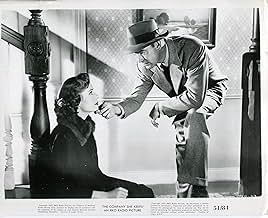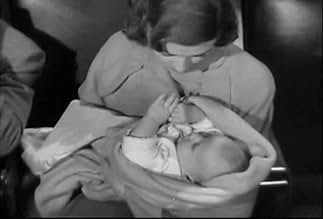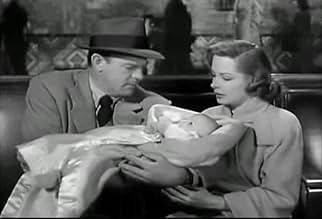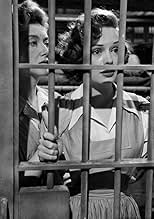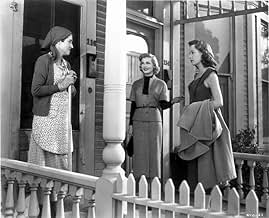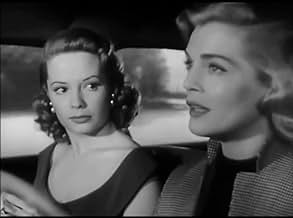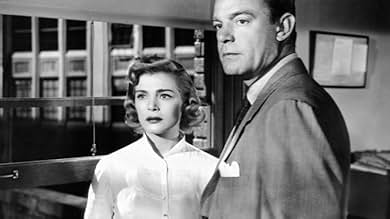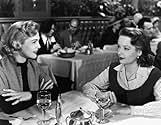CALIFICACIÓN DE IMDb
6.3/10
673
TU CALIFICACIÓN
Una ex convicta intenta reconstruir su vida después de ser liberada de la prisión.Una ex convicta intenta reconstruir su vida después de ser liberada de la prisión.Una ex convicta intenta reconstruir su vida después de ser liberada de la prisión.
- Dirección
- Guionista
- Elenco
Eric Alden
- Sergeant of Detectives
- (sin créditos)
Parley Baer
- Steve
- (sin créditos)
Larry Barton
- Store Detective
- (sin créditos)
June Benbow
- Myrtle
- (sin créditos)
Lela Bliss
- Window Shopper
- (sin créditos)
Gail Bonney
- Nurse
- (sin créditos)
- Dirección
- Guionista
- Todo el elenco y el equipo
- Producción, taquilla y más en IMDbPro
Opiniones destacadas
I fell for Lizabeth Scott in Too Late for Tears, and she's delicious here as a tortured altruist. But it's Jane Greer as the broken dove who has a the limelight for the first two acts. The shades of gray--and green--make this a juicy little melodrama for both characters. Indeed, the lesbian tension is palpable in the beginning (and I didn't know about Scott's reputation), suggesting much more than the film makers may have intended (but, oh, what a movie this COULD have been...). Dennis O'Keefe is the weak link, looking older than his 43 years and strolling thru scenes without adding much flavor. Fay Baker is a nice addition as the tough girl that Greer might have been without the help she gets.
The Company She Keeps might be viewed as John Cromwell's soft-hearted "sequel" to his great Caged of the same year (some of the same cast members reappear in small parts in both). Taking over the Eleanor Parker role -- the embittered parolee with a chip-on-the-shoulder attitude -- Jane Greer finally goes "freeside." Lizabeth Scott meets her at the train, not as a mentor into the world of vice but wasted as Greer's saintly parole officer. Greer makes it plain that she's none too happy with the constraints (a night-shift job, frumpy clothes, no drinking) imposed upon her, and promptly sets her hat for Scott's fiance Dennis O'Keefe, who tumbles right into it.
And this is where Ketti Frings' script loses whatever edge it had. The hard, manipulative Greer goes soft around the edges, conflicted and vacillating. Scott, meanwhile, magnanimously cedes O'Keefe to her rival and continues to advocate on her behalf with redoubled passion (an opposite change of heart would have furnished welcome friction).
Luckily, a few goblins still hover in the shadows, and, in a brief scene set in Los Angeles' municipal lockup, Cromwell manages to reprise some of the black magic of Caged. But the syrupy social messages and Frings' earnest kind-heartedness almost sink the movie, which nonetheless preserves one of Greer's rare appearances in the noir cycle, particularly savory at the movie's start and near its end. Just don't expect another Kathie Moffat from Out of the Past.
And this is where Ketti Frings' script loses whatever edge it had. The hard, manipulative Greer goes soft around the edges, conflicted and vacillating. Scott, meanwhile, magnanimously cedes O'Keefe to her rival and continues to advocate on her behalf with redoubled passion (an opposite change of heart would have furnished welcome friction).
Luckily, a few goblins still hover in the shadows, and, in a brief scene set in Los Angeles' municipal lockup, Cromwell manages to reprise some of the black magic of Caged. But the syrupy social messages and Frings' earnest kind-heartedness almost sink the movie, which nonetheless preserves one of Greer's rare appearances in the noir cycle, particularly savory at the movie's start and near its end. Just don't expect another Kathie Moffat from Out of the Past.
This film does not fall short by any means. The Company She Keeps is a story of a young woman's plight named Diane Stuart (played by Jane Greer) that lands her behind bars on more than one occasion and when the opportunity for parole arises she has developed such a defeatist attitude that she feels she is fighting everyone in the (in)justice system. If Diane did not have bad luck she would have no luck at all. Once out of prison she visits with her parole officer Joan Willburn (played by Lizabeth Scott) and by accident or intention Diane finds the man of her dreams a newspaper columnist named Larry Collins (played by Dennis O'Keefe).
The three main characters in this film, Diane Stuart (ex-con), Joan Wilburn (parole officer), and Larry Collins (newspaper columnist) form the love triangle that has deception written all over this screen play. Lies, lies, lies, or is it just that each person is reluctant to hurt the others feelings?
As the film progresses we the audience realize that even female paroled prisoners are still considered ex-cons and their life is subjected to hell, especially in the year 1951 which is when this film was released. Truth be told, the rights and freedoms of ex- cons has not progressed much over the past 70 odd years.
Inevitably Diane finds herself in a police line-up once again for nothing at all and she realizes her life is crap and any chance of true love, life and freedom was nothing more than a pipe dream.
I won't spoil the film for anyone, but I will say that the director John Cromwell provided the audience with a surprise ending that should make most of his audience leaving the movie theater with a lot to talk about. The performances of Lizabeth Scott, Jane Greer, and Dennis O'Keefe were top notch. After close to 70 years since the films release I felt the film still contains a lot of human interest as it relates to crime and punishment.
I give the film 4**** of 5*****.
The three main characters in this film, Diane Stuart (ex-con), Joan Wilburn (parole officer), and Larry Collins (newspaper columnist) form the love triangle that has deception written all over this screen play. Lies, lies, lies, or is it just that each person is reluctant to hurt the others feelings?
As the film progresses we the audience realize that even female paroled prisoners are still considered ex-cons and their life is subjected to hell, especially in the year 1951 which is when this film was released. Truth be told, the rights and freedoms of ex- cons has not progressed much over the past 70 odd years.
Inevitably Diane finds herself in a police line-up once again for nothing at all and she realizes her life is crap and any chance of true love, life and freedom was nothing more than a pipe dream.
I won't spoil the film for anyone, but I will say that the director John Cromwell provided the audience with a surprise ending that should make most of his audience leaving the movie theater with a lot to talk about. The performances of Lizabeth Scott, Jane Greer, and Dennis O'Keefe were top notch. After close to 70 years since the films release I felt the film still contains a lot of human interest as it relates to crime and punishment.
I give the film 4**** of 5*****.
Scott and Greer are very good in this "woman gets out of prison" movie that could have been awful. Cromwell directs crisply and many shots are well lit and evocative. This may or may not be film-noir, depending on the viewer's perspective, but it holds up well. If you can find it on TV, it is well worth taping, since it is not easy to find on video.
Jane Greer and Lizabeth Scott star in 1951's "The Company She Keeps," directed by John Cromwell and also starring Dennis O'Keefe. O'Keefe is columnist Larry Collins involved with parole officer Joan Wilburn (Scott), who has Diane Stuart (Greer) as a client. Stuart makes a play for Collins and gets him. The two fall in love, and Joan finds out about it, making her position rather difficult.
This isn't a big movie and provides a different sort of role for Scott. Here she's a good girl with shorter hair, and she almost reminds one of June Allyson. She's quite beautiful and does a good job, though I prefer her as a '40s bad girl. O'Keefe is a serviceable leading man.
The film belongs to the fabulous Greer. In the beginning, at her parole hearing, she's shy, soft and sweet. Once she's out - whoa! The angry, bitter tough gal comes through, only showing her vulnerable side once she falls for Larry.
Worth seeing for Greer.
This isn't a big movie and provides a different sort of role for Scott. Here she's a good girl with shorter hair, and she almost reminds one of June Allyson. She's quite beautiful and does a good job, though I prefer her as a '40s bad girl. O'Keefe is a serviceable leading man.
The film belongs to the fabulous Greer. In the beginning, at her parole hearing, she's shy, soft and sweet. Once she's out - whoa! The angry, bitter tough gal comes through, only showing her vulnerable side once she falls for Larry.
Worth seeing for Greer.
¿Sabías que…?
- TriviaAt one point, four month-old Jeff Bridges, playing the baby Jane Greer is holding in the train station, was supposed to cry. To get him to cry, Jeff's mother, Dorothy Dean Bridges, suggested they pinch him.
- ConexionesFeatured in 2019 Golden Globe Awards (2019)
Selecciones populares
Inicia sesión para calificar y agrega a la lista de videos para obtener recomendaciones personalizadas
- How long is The Company She Keeps?Con tecnología de Alexa
Detalles
- Fecha de lanzamiento
- País de origen
- Idioma
- También se conoce como
- The Company She Keeps
- Locaciones de filmación
- 114-116 North Hope Street, Los Ángeles, California, Estados Unidos(Diane Stuart's apartment building)
- Productora
- Ver más créditos de la compañía en IMDbPro
- Tiempo de ejecución1 hora 22 minutos
- Color
- Relación de aspecto
- 1.37 : 1
Contribuir a esta página
Sugiere una edición o agrega el contenido que falta

Principales brechas de datos
By what name was Dos mujeres (1951) officially released in Canada in English?
Responda
